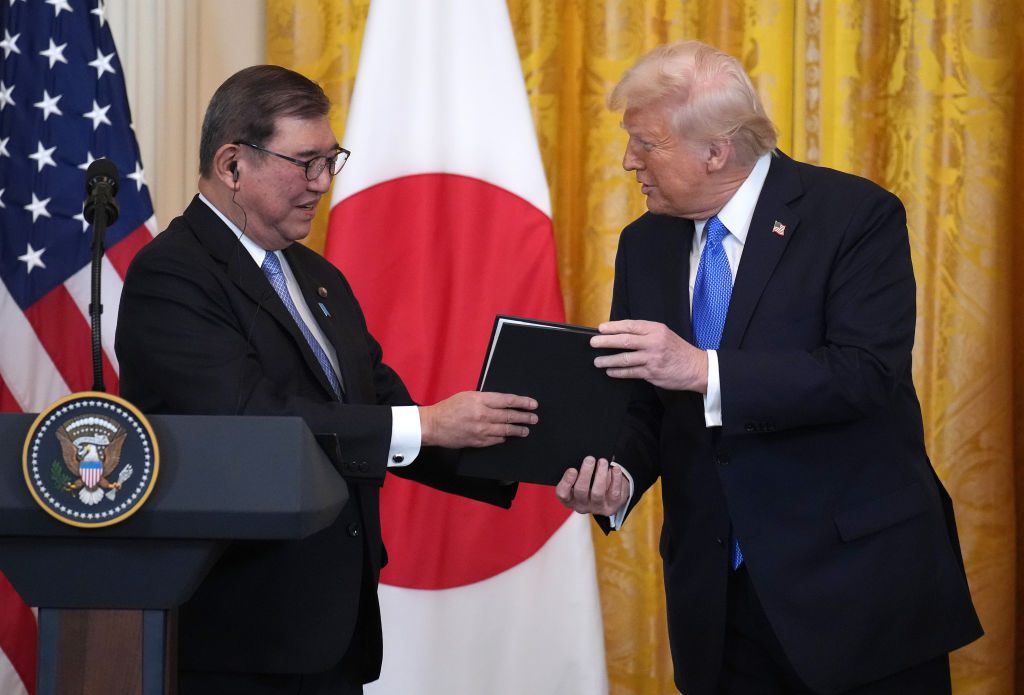What President Trump referred to as “the largest TRADE DEAL in history” (his emphasis) has been signed between the US and Japan. “Mission complete” was the more modest tweeted response of the hardworking and frequent flyer, Japanese trade negotiator Ryosei Akazawa, on his eighth visit to Washington. The announcement comes just a week before Trump’s 1 August tariff deadline, after which a 25% duty would have been slapped on all Japanese goods and days after Japanese Prime Minister Shigeru Ishiba lost his majority in upper house elections.
The headline agreement is a reduced reciprocal tariff rate of 15% along with a promise of $550 billion of Japanese investment in the US. There is even the possibility of a joint US-Japanese gas pipeline project in Alaska. All this was enough to send the Nikkei up by 3.5%, with automaker stocks significantly healthier. Even the seemingly moribund yen firmed a little against the dollar before falling back in response to rumours (swiftly denied) that Ishiba might resign.
The general feeling here in Tokyo is one of relief. It looks, on the surface at least, a reasonable outcome from what had appeared a mutually disadvantageous impasse. Japan’s embattled Prime Minister has pointed out that the tariffs will be the lowest of any country with a surplus with the US. And with flexibility now apparently in the mix, there may be hope that the 15% figure could be further whittled down in time. The “carmageddon” scenario of a collapse in the Japanese auto sector, which employs six million people, appears to have been averted.
When the euphoria dies down, though, and the fine print is dissected, questions will inevitably arise. Who really won this contest? Is it win-win, as Trump might describe it, or just a win for the US? And what are the long-term implications? For Japan, a 15% tariff will now apply where previously there was none. The deal offers little in return: since Japan imports relatively few American goods, the promise of reciprocity brings minimal benefit.
A note of caution should therefore be struck: Matsui Securities senior analyst Tomoichiro Kubota, quoted in the Nikkei Asia, pointed out the main reason for the positivity in the markets was not that the deal was fantastic, but that it cleared the air and promised a period of stability — a particularly important factor in risk-averse Japan.
Other parts of the deal merit scepticism too. Japan will presumably be expected to make good on that massive promised investment within a reasonable timescale and it is not clear what form that will take or who ultimately will benefit. As for the pipeline deal in Alaska, it may be wonderful but at the amounts it all sounds a bit Panglossian in scale and likelihood of being realised.
And will the mercurial Trump even be satisfied? His main complaint about Japan has always been the belief that American manufacturers are unfairly excluded from the Japanese market — a claim Tokyo strongly denies and one that was always on shaky ground. But if the trade imbalance continues, as Japan’s automakers keep adapting and innovating while American cars fail to win over Japanese consumers, Trump’s hostility is unlikely to fade.











Join the discussion
Join like minded readers that support our journalism by becoming a paid subscriber
To join the discussion in the comments, become a paid subscriber.
Join like minded readers that support our journalism, read unlimited articles and enjoy other subscriber-only benefits.
Subscribe